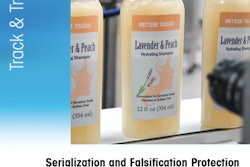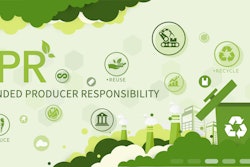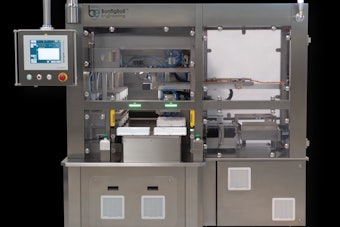This content was written and submitted by the supplier. It has only been modified to comply with this publication’s space and style.
The subject of the circular economy is becoming in- creasingly important in the plastic packaging industry in Germany and Europe. In the light of this, the IK Indus- trievereinigung Kunststo verpackungen e. V. explicitly welcomes the European Commission initiative on devel- oping a vision for the future of the plastics industry in Europe. We especially value the fact that in the process the Commission has taken political decision-makers, the entire value creation chain and the consumer into con- sideration and at the same time highlighted their com- mitments. With regard to public discussion of the circular economy, the IK considers it essential that we succeed in anchoring plastic as a reusable material of high value in the minds of all involved parties.
With its paper, the Commission explicitly recognises the value of the plastics industry for the European economy and stresses the contribution that plastic as a material can make to tackling the challenges of the future. Plastic pack- aging in particular protects foods and other products on their way to the consumer and therefore plays a key role in the preservation of resources.
The Commission strategy now being announced lays down essential milestones for guiding the plastics sector in the coming years and sets out relatively concrete targets for the period until 2030. Many of the stated demands are in line with those of the IK position. The call for signi cant expansion of recyclability also pushes ahead the design for recycling. In Germany, many of these required meas- ures have already been put into place or will become a reality in the near future as part of the implementation of the new packaging legislation.
The strategy paper is of far-reaching signi cance, and we assume that in the years to come it will become the focal point of a socio-political dialogue on the future of the plastics industry.
The German plastic packaging industry is taking an active role in the Europe-wide dialogue on the future of the plas- tics industry and is committed to seeing the vision of a new circular economy for the European plastics industry becoming a reality.
As an industry association, the IK (German Plastics Packaging Industry Association) represents the in- terests of manufacturers of plastics packaging and lms in Germany and Europe. The industry which
is characterised by many small and medium-sized businesses has over 90,000 employees and generates an annual turnover of 14 billion Euros. Plastics packa- ging currently has a 44-percent share of the German packaging market.
The IK is the largest umbrella association in the Ger- man Association of Plastics Converters (GKV) and is therefore also involved in matters concerning the entire plastics processing industry.
2
* ”A European Strategy For Plastics In A Circular Economy“ (published on 16.1.2018)
With its Plastics Strategy, the EU Commission has clearly addressed and formulated its demands for a circular economy model for plastic packaging and measures to promote this, as well as for the restriction of littering. While on the whole we welcome the Plastics Strategy, certain aspects deserve to be highlighted, others examined critically.
1.
... the call for design for recycling
However, recyclability is not the only criterion for sus- tainability.
We support the political objective whereby all plastic packaging on the European market should either by recyclable or reusable by 2030. The industry acknowledges its responsibility and is investing in research, development and production. In Germany, three-quar- ters of all plastic packaging is already recyclable. Over 50 % of the plastic packaging brought onto the German end-consumer market is recycled.
Recyclability, however, is not always the main, let alone the only cri- terion when it comes to deciding for or against a material. Rather, it is other sustainability factors, such as the importance of product protection, which come into consideration. Recycling is an impor- tant aspect of eco-design, but eco-design is more than just design for recycling. The environmental impact of plastic packaging should not be evaluated merely at the end of its useful life, but throughout its entire use phase.
2.
... the voluntary self-commitment of the plastics industry
As a member of the signatory associations European Plastics Con- verters (EuPC), Petcore Europe and Polyole n Circular Economy Platform (PCEP), IK supports the voluntary self-commitment of the plastics industry as an important impulse to implement the Plastics Strategy. The voluntary self-commitment contains concrete quotas for recyclability and multiple use with respect to the milestones 2020, 2030 and 2040. Of particular interest are polyethylene and po- lypropylene (polyele n) packagings, constituting the biggest share of around 70% of the European plastics packaging market.
*„The European Plastics Industry Circular Economy Voluntary Commitments” (published on 16.1.2018)
IN PARTICULAR, WE SUPPORT ...
IK measures
-
The Round Table Eco Design is an initiative launched by the IK to promote the eco-design of plastic packaging, primarily by the drawing up of guidelines and recommendations for the actors involved in the value chain. [www.ecodesign-packaging.org]
-
The PackTheFuture Award, presented jointly by the IK and the French Plastic and Flexible Packaging Association (ELIPSO), honours innovative and sustainable plastic packaging. [www.packthefuture.com]
|
Targets of the voluntary self-commitment of the plastics converting industry in Europe* |
|||
|
70% recycling- and reuse rate for collected plastic packaging |
|||
|
60% recycling- and reuse rate for collected polyole n packagings |
|||
|
65% recycling- and reuse rate for collected PET-packagings |
|||
|
Speci cation of a recycling rate for polyole n lms used in agri- culture |
3
2020
2030
2040
3.
... the demand for improved collection and sorting of waste.
Collection and sorting of waste must be expanded and improved throughout Europe.
We support the aim of the voluntary self-commitment of the plastics converting industry to specify a recycling rate for polyole n lms used in agriculture in 2020.
4.
... the demand for the increased use of recycled material.
We are committed to an increase in the use of recycled material in plastic packaging. From an IK perspective, the use of recycled mate- rial contributes to resource e ciency, reduces costs and expands the supplier base for packaging manufacturers.
We consider the poor quality and lack of availability of recycled ma- terial to be the greater hindrances to the use of plastic recyclates. Quality standards make a contribution to overcome these hindranc- es. But waste separation by the consumer plays also a key role in this context. Here, education of consumers is called for. Furthermore, there is a need for investment in state-of-the-art sorting facilities that can handle the required quantities and sort them most e ciently. Fortunately, such investments are already being made, following the passing of the “German Packaging Act”.
As a trade association, we are concentrating on increasing the use of recycled material in the non-food sector. In the near future, we will not be encouraging the use of recycled material in the food sector, except for PET packaging.
5.
... the consistent implementation of existing waste legislation.
We require the consistent implementation of existing laws and are committed to the extension of land ll bans for plastic products already operating in some countries to the rest of Europe.
IK measures
-
Membership and cooperation of IK with
Polyole n Circular Economy Platform (PCEP) and Petcore Europe with the purpose to close loops together with the players of the whole supply chain.
-
IK has initiated the RAL quality associa- tion „Wertsto kette PET-Getränkever- packungen e.V.“, which aims at increas- ing the share of recycled material in PET beverage bottles. (http://wertsto -pet.de/en)
4
IK measures
• Erntekunststo e Recycling Deutschland (ERDE): ERDE is a recovery concept for crop plastics in Europe. [www.erde-recycling.de]
6.
... the global commitment to combat marine litter.
IK supports the measures mentioned in the Plastics Strategy to reduce the current input of plastic waste into the European seas. The European commission refers in its strategy paper to the input of plastic waste especially due to newly industrialised countries. Indeed, 80 % of marine waste originates in Asia.
We therefore support a global approach to this topic and expect European commitment, coupled with the measures implemented here, to serve as an example for implementation in other countries.
IK measures
-
We are co-signatories to the Declaration of the Global Plastics Associations for Solutions on Marine Litter. [www.marinelittersolutions.com]
-
We are part of the Global Plastics Alli- ance, which collaborates with plastics trade associations in Asian countries, America and Africa on the building of strategies for combating marine litter.
-
Participation in Marine Litter Round Table: The Marine Litter Round Table was initiated in 2016 by the Federal Minister for the Environment, the Minster for the Environment in Lower Saxony and the President of the Federal Environment Agency. The Round Table sets out to co- ordinate national measures for combat- ing marine litter Germany and promote their implementation.
-
Zero Pellet Loss: This initiative unites member companies of the IK in the battle to stop the input of plastic pellets into the environment.
7.
... the rejection of super uous or oversized packaging.
We reject packaging which is super uous, i.e. which ful ls no actu- al purpose such as protecting packaged goods during transport or storage, informing the consumer or meeting hygiene requirements, as well as the use of oversized packaging. It is in the interests of the industry itself, from an ecological and economic perspective, to min- imise resource consumption.
5
8.
... the critical examination of so-called “oxo-degradable plastics”.
“Oxo-degradable plastics“ do not meet the requirements of com- plete biodegradability. Here it is more a question of the breakdown of plastics into small, visible or invisible fragments which exacerbate the current problem concerning the entry of microplastics into wa- terways and seas. “Oxo-degradable plastics” also have a detrimental e ect on recycling.
WE ARE CRITICAL OF ...
1.
... the misleading use of the term “single use plastics”.
“Single use plastics” is a misleading term for a multitude of applica- tions. By using the term, the impression is often created single use products is in general a throwaway and therefore to be avoided. Here, however, single use is often a reasonable response to par- ticular product characteristics or hygiene requirements which can frequently only be satis ed by the use of plastics. Take blood bags, disposable contact lenses or packaging for fresh meat, for example.
In the Plastics Strategy, the term “single use plastics” is used equally to refer to both “to-go” products as well as speci c service packag- ing. Whereas the packaging employed in industry and commerce is generally only used once, it di ers signi cantly from “to-go” prod- ucts in terms of useful life and post-use phase.
The hitherto unspeci c use of the “single use plastics” de nition has wrongly led to the conclusion that these plastic products are dis- carded after a very short use phase and not recycled. Such general assumptions do not apply, however, to most packaging. On the con- trary, in the retail sector, the packaging ful ls an important protec- tive function during transport and storage, even before sale to the consumer. Moreover, after use packaging is collected at home or in the industry and sent for recycling or energic recovery.
Single use plastics
Incineration
IK commitment:
-
The IK has adopted a critical stance towards “oxo-degradable plastics” in its publication „Frequently Asked Ques- tions (FAQs) about oxo-degradable plastics” (March 2017).
-
The IK is a co-signatory of a statement by the Ellen MacArthur Foundation (November 2017) which clearly speaks out against “oxo-degradable plastics”.
misleading
6
2.
... the misleading use of the term “incineration”.
The di erentiation between incineration and energy recovery which has already established itself in political debate is not as yet re ect- ed in the wording of the Plastics Strategy, which talks exclusively of incineration. This usage is misleading because it fails to take into account the generation of energy and also the savings of fossil fuels.
ADDITIONALLY, WE WOULD LIKE TO POINT OUT ...
... that in the discussion about the Plastics Strategy we miss a holistic view of plastic packaging.
While the Plastics Strategy puts the spotlight on packaging at the end of its life cycle, it pays little attention to its use. It is precisely in the course of the use phase that plastic packaging makes a key con- tribution to resource e ciency and climate protection. Packaging ensures that products reach the consumer intact. That is essential for our environment, since were goods to be damaged, the resources and energy required for their production would have been wasted. Packaging made of plastic has very special properties, such as o er- ing an oxygen barrier to protect food in particular against spoilage, therefore avoiding the need to throw it away. At the same time, such packaging is very light and hence saves fuel during transport.
reaches the end-consumer undamaged
>>For more information, click here





















